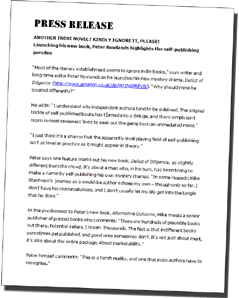As part of the launch of my latest mystery drama, Deficit of Diligence (www.amazon.co.uk/dp/B01N0PRFV0/) I sent a press release out to the literary press, and immediately received several replies saying, “Sorry, we don’t review e-books.”
I expected nothing else. How could they? If they did, or even intimated that they might, they would be inundated with emails containing e-books or links to them. It must be hard enough for mainstream reviewers to dig their way through all the printed books that traditional publishers send them. If you multiply that number by a massive factor, you’ll arrive at the number of e-books they’d receive.
Far more challenging for them than the numbers alone, however, is the absence of the “credentials” that a traditional publisher is seen to confer by its very involvement in any book. It says the book has been considered, checked, corrected, massaged and fine-tuned with a professional’s eye. It has the backing of a business that’s prepared to invest its own money – speculatively – on the chance that it might make a profit from the publishing process for itself and the author.
By contrast, a self-published e-book comes recommended by the author alone. From a reviewer’s point of view, what value has that? Every author thinks his or her book is wonderful, but it proves nothing. Life is too short for most mainstream reviewers to read even a single page to find out if an e-book seems to have potential.
So I’m sanguine – but I’m also sad. I think my books, and the books of thousands of other independent writers like me, do deserve an airing by mainstream reviewers. The trouble is, I don’t know how it will ever happen. Publishers, whether you love them or hate them, are believed to confer a kind of authority. Their participation represents a massive tick box, whether the individual book happens to be good or bad. Independent books have no such benefit.
Self-evidently, some alternative “credential” is required – some stamp of authority that says a given e-book is at least worth putting in the starting gate when it comes to consideration for review. But what on earth would this look like? Who could confer such a thing without reinventing the notion of a “gatekeeper” – which is exactly what many indie writers hate about the publishing establishment? I don’t have answers, and I’d love to know if anyone else does.
If you’re interested, the whole text of my press release for literary publications is here as a PDF. In it, I quote myself (well, why not?) as follows:
“Without some kind of qualitative mediation on traditional lines, the sheer magnitude of e-book output is in some ways its own worst enemy. That’s the self-publishing paradox.
“In a way this press release is my own appeal for open-mindedness. That’s all I can ask, really. The world doesn’t owe me a living, and I’m not saying my new book is the best thing since sliced bread. It’s not. But I believe that like a lot of indie books, it deserves a wider audience than it is likely to get the way things are now.”


